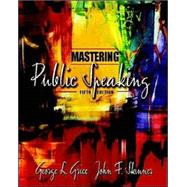
Preface to the Student.
Preface to the Instructor.
1. An Introduction to Public Speaking.
Why Study Public Speaking?
Definitions of Communication.
Levels of Communication.
Elements of Communication.
The Public Speaker as Critical Thinker.
2. The Ethics of Public Speaking.
Definition of Ethics.
Principles of Ethics.
Ethical Speaking.
Ethical Listening.
Fair Use Guidelines.
Plagiarism.
3. Speaking Confidently.
Recognize That Speaker Nervousness Is Normal.
Control Speaker Nervousness.
Learn How to Build Speaker Confidence.
Prepare Your First Speech.
4. Responding to Speeches.
The Importance of Listening.
Listening vs. Hearing.
The Process of Listening.
Obstacles to Effective Listening.
Promoting Better Listening.
Critiquing Speeches.
Acting on Criticism.
5. Analyzing Your Audience.
Recognize the Value of Audience Diversity.
Analyze Your Audience Before the Speech.
Analyze Your Audience During the Speech.
Analyze Your Audience After the Speech
6. Selecting Your Speech Topic.
Generate Ideas.
Select Your Topic.
Focus Your Topic.
Determine Your General Purpose.
Formulate Your Specific Purpose.
Word Your Thesis Statement.
Develop Your Speech Title.
7. Researching Your Topic.
Assess Your Personal Knowledge.
Develop Your Research Plan.
Collect Your Information.
Record Your Information.
Conclude Your Search.
8. Supporting Your Speech.
Purposes of Supporting Materials.
Types of Supporting Materials.
Tests of Evidence.
Evaluating Electronic Information.
Citing Your Sources.
9. Organizing the Body of Your Speech.
Formulate an Organizing Question.
Divide the Speech into Key Ideas.
Develop the Key Ideas.
Connect the Key Ideas.
10. Introducing and Concluding Your Speech.
Organize the Introduction of the Speech.
Organize the Conclusion of the Speech.
11. Outlining Your Speech.
Functions of Outlining.
Principles of Outlining.
Stages of Outlining.
12. Wording Your Speech.
Functions of Language.
Principles of Effective Language Use.
13. Delivering Your Speech.
Principles of Nonverbal Communication.
Methods of Delivery.
Qualities of Effective Delivery.
Elements of Vocal Delivery.
Elements of Physical Delivery.
14. Using Presentational Aids.
The Importance of Using Presentational Aids.
Types of Presentational Aids.
Guidelines for Designing Presentational Aids.
Strategies for Using Presentational Aids.
15. Speaking to Inform.
Characteristics of a Speech to Inform.
Informative Speech Topics.
Guidelines for Speaking to Inform.
Annotated Sample Speech: The Amish: Seeking to Lose the Self.
16. The Strategy of Persuasion.
The Importance of Persuasion.
A Definition of Persuasion.
Types of Influence.
The Pyramid of Persuasion.
Types of Persuasive Speeches.
Persuasive Speaking Strategies.
17. The Structure of Persuasion.
Making and Refuting Arguments.
Types of Argument.
Fallacies of Argument.
Selecting Propositions for Persuasive Speeches.
Monroe's Motivated Sequence.
Annotated Sample Speech: Diploma Mills.
18. Speaking on Special Occasions.
The Speech of Introduction.
The Speech of Presentation.
The Acceptance Speech.
The Speech of Tribute.
The Speech to Entertain.
The Impromptu Speech.
The Question-Answer Period.
The Videotaped Speech.
19. Speaking in and as a Group.
Small Group Communication and Public Speaking.
Small Groups Defined.
Types of Groups.
Group Discussion and Decision Making.
The Group Presentation.
Appendix: Sample Speeches.
Renaissance Fairs, Melissa Janoske
Critique of Renaissance Fairs, Donika K. Patel
Steganography, Tiffanie K. Petrin
Heart Disease in Women, Jake Gruber
Adaptive Brain Interfaces, Chad Crowson
Persuasive Speech, Gene Fox
Speech of Tribute, Edwin C. Anderson
I Have a Dream, Martin Luther King, Jr.
Notes.
Photo Credits.
Name Index.
Subject Index.
The New copy of this book will include any supplemental materials advertised. Please check the title of the book to determine if it should include any access cards, study guides, lab manuals, CDs, etc.
The Used, Rental and eBook copies of this book are not guaranteed to include any supplemental materials. Typically, only the book itself is included. This is true even if the title states it includes any access cards, study guides, lab manuals, CDs, etc.